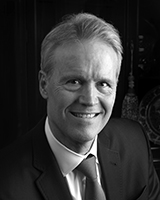
David B. Hellmann,
MD, MACP
One of the many wonderful gifts I received from my dad was his fascination with words — and the more complex the word, the better. Into this category falls “agathokakological.” A mouthful by any measure, it beautifully combines Greek roots to describe something that is simultaneously good (agathos) and bad or evil (kakos).
As I survey the unprecedented challenges at play today in health care, and the heroic way that CIM donors and faculty members are stepping up to meet them, it strikes me that “agathokakological” is an ideal descriptor. Or, to put a more literary spin on it, I could borrow from Dickens’ opening line to A Tale of Two Cities: “It was the best of times. It was the worst of times.”
In response to recent catastrophic cuts to federal research funding for talented clinician-scientists, CIM’s donors have met kakos with agathos by generously funding the Next Generation Scholars program. As you’ll read, the program will support the work of 11 early career clinician-scientists at Johns Hopkins with up to $300,000 in funding over three years. It’s impossible to overstate the impact this timely funding will have in ensuring that life-saving advances in human health don’t wither on the vine.
Among the pressing health challenges we face today is Alzheimer’s disease. You’ll be encouraged to know that pathologist Meaghan O’Malley Morris, the Anne and C. Michael Armstrong CIM Human Aging Project (HAP) Scholar, is stepping up with creative approaches in the lab aimed at stopping Alzheimer’s early in its tracks, before it wreaks kakos.
Alzheimer’s disease isn’t the only threat to our rapidly aging population. Fortunately, with the opening of the Human Aging Project’s new translational research hub, Johns Hopkins engineers and clinicians are collaborating to enable older Americans to experience “the best of times” — healthy, independent living, for as long as possible. The launch of Geriatrics Engineering@Johns Hopkins, truly a source of agathos, is tempered by our great sadness at the recent passing of HAP’s founding director Jeremy Walston. While we all miss Jeremy terribly, the Human Aging Project stands as a proud tribute to his vision.
There are other reasons for optimism in the face of current trying circumstances, like the way CIM’s Center for Humanizing Medicine is multiplying improvements in patient care across Johns Hopkins through CHM’s impact grants, and the legacy that CIM’s Amos Food, Body and Mind Center has had in bringing relief — and defining a new syndrome — to hundreds of patients afflicted by physical and psychological distress.
I am so grateful to the many friends of CIM, and faculty members, whose unflagging commitment to agathos are enabling advances in patient care to continue during these tumultuous times.

David B. Hellmann, M.D., M.A.C.P.
Aliki Perroti Professor of Medicine